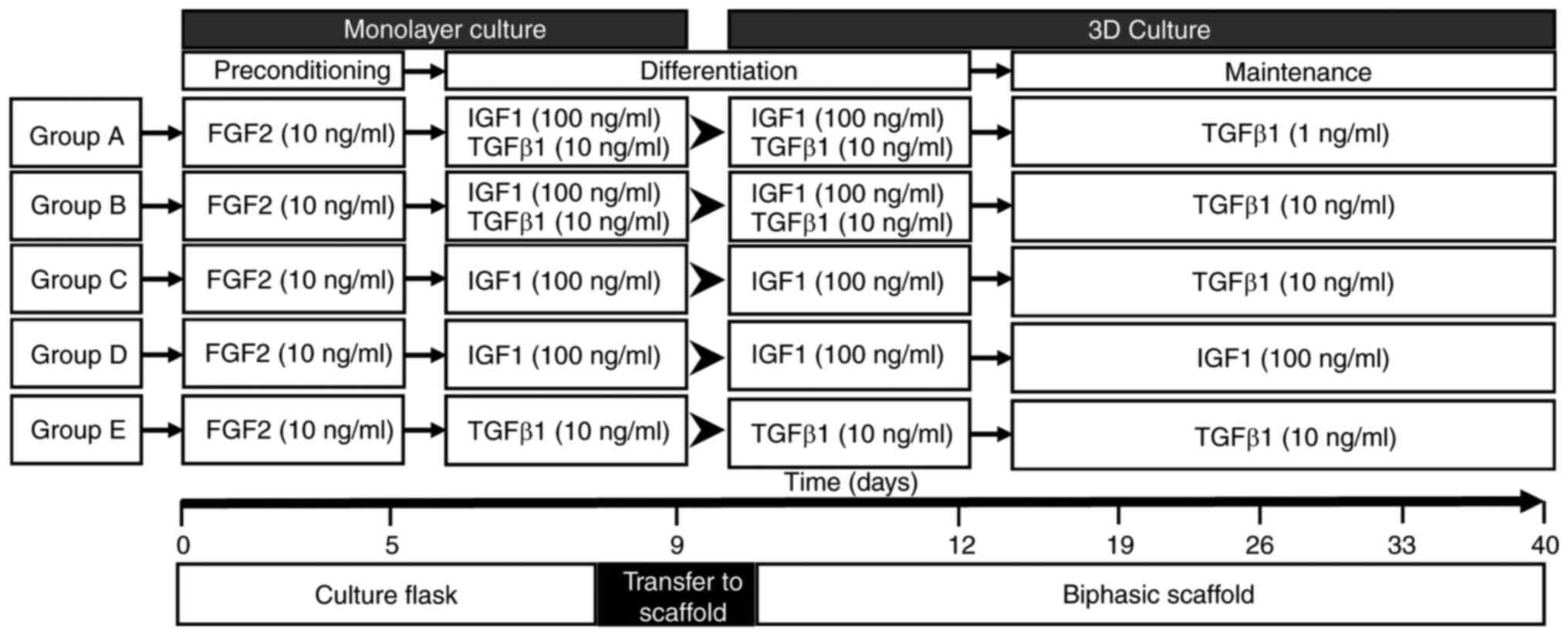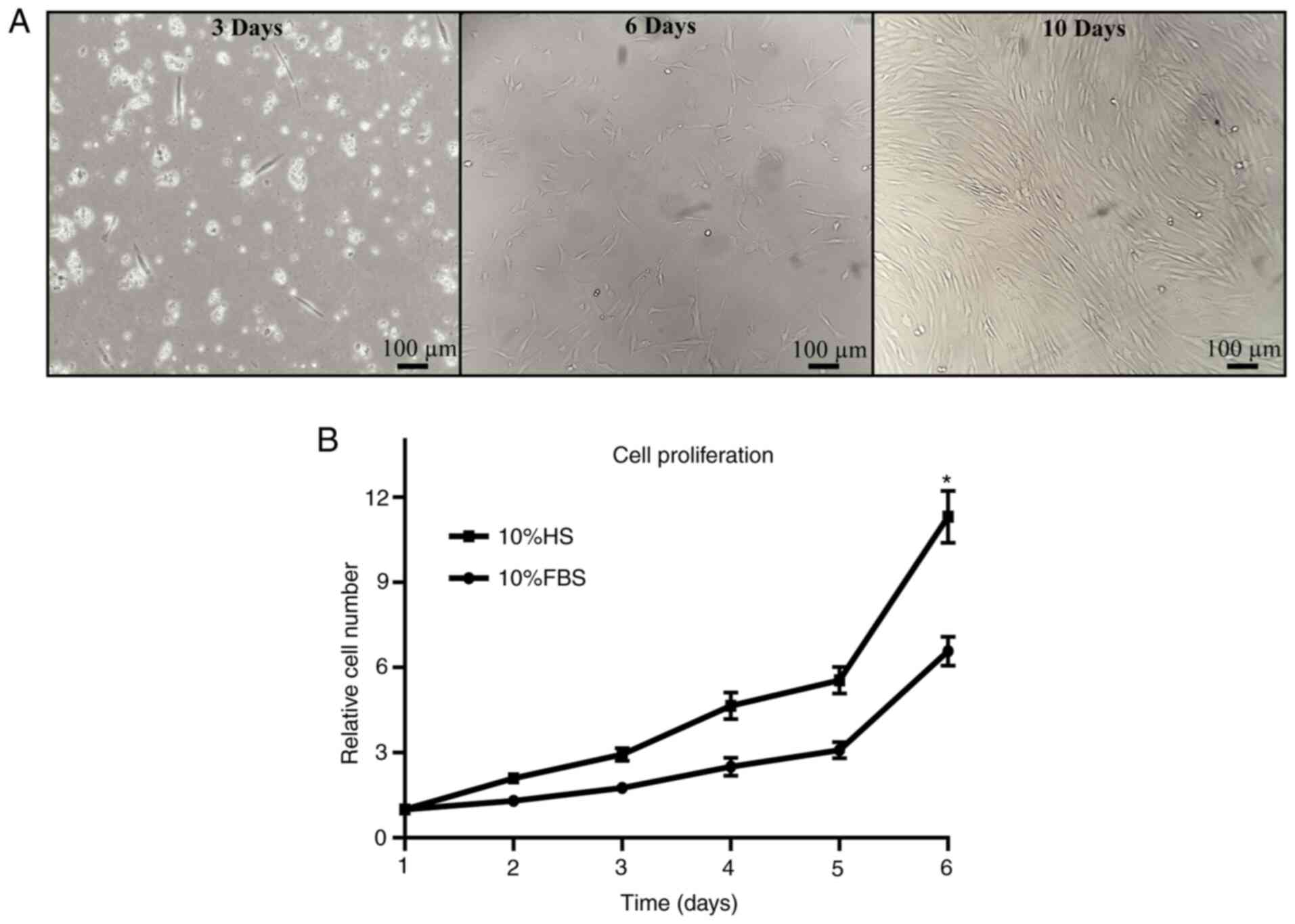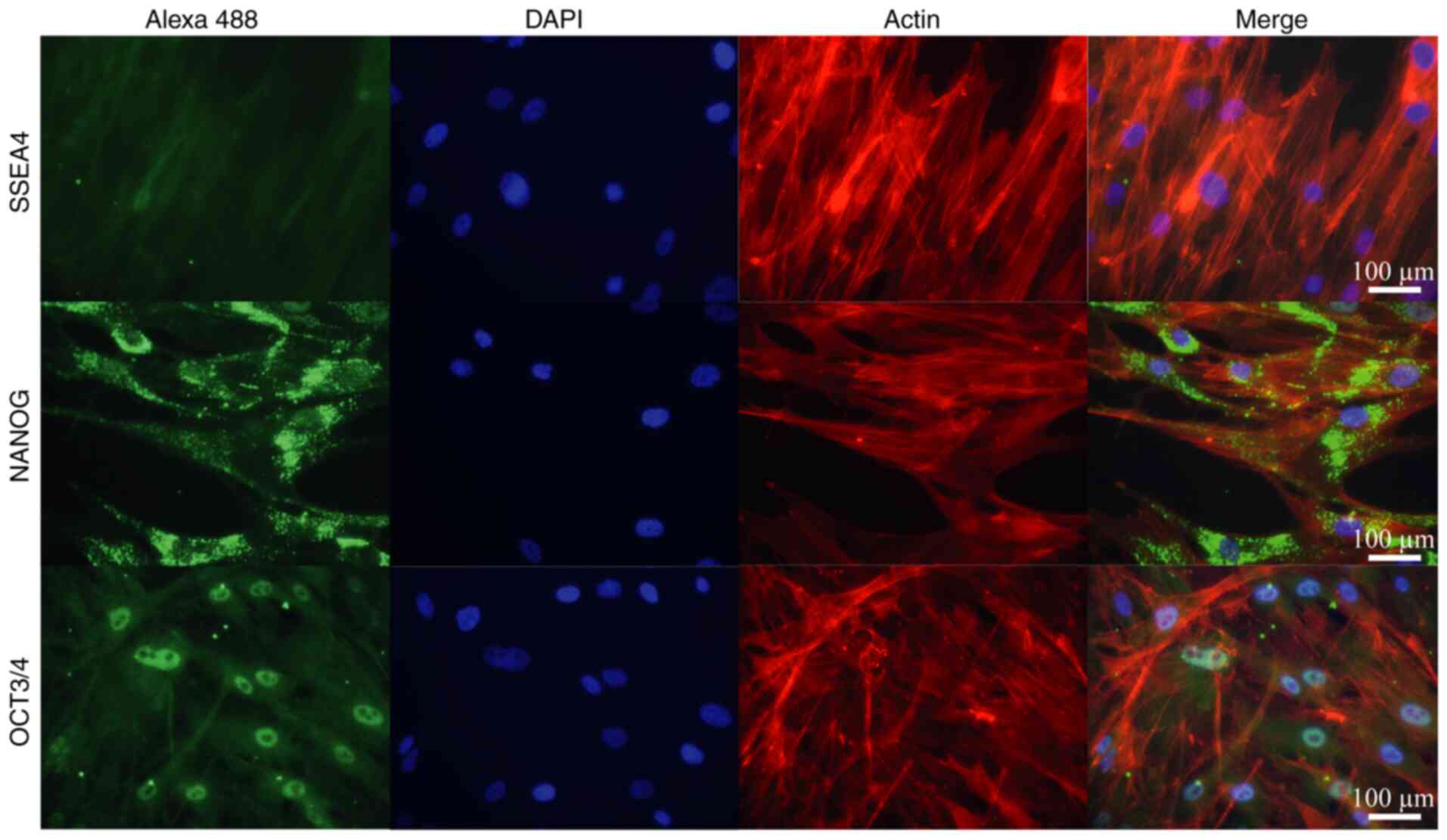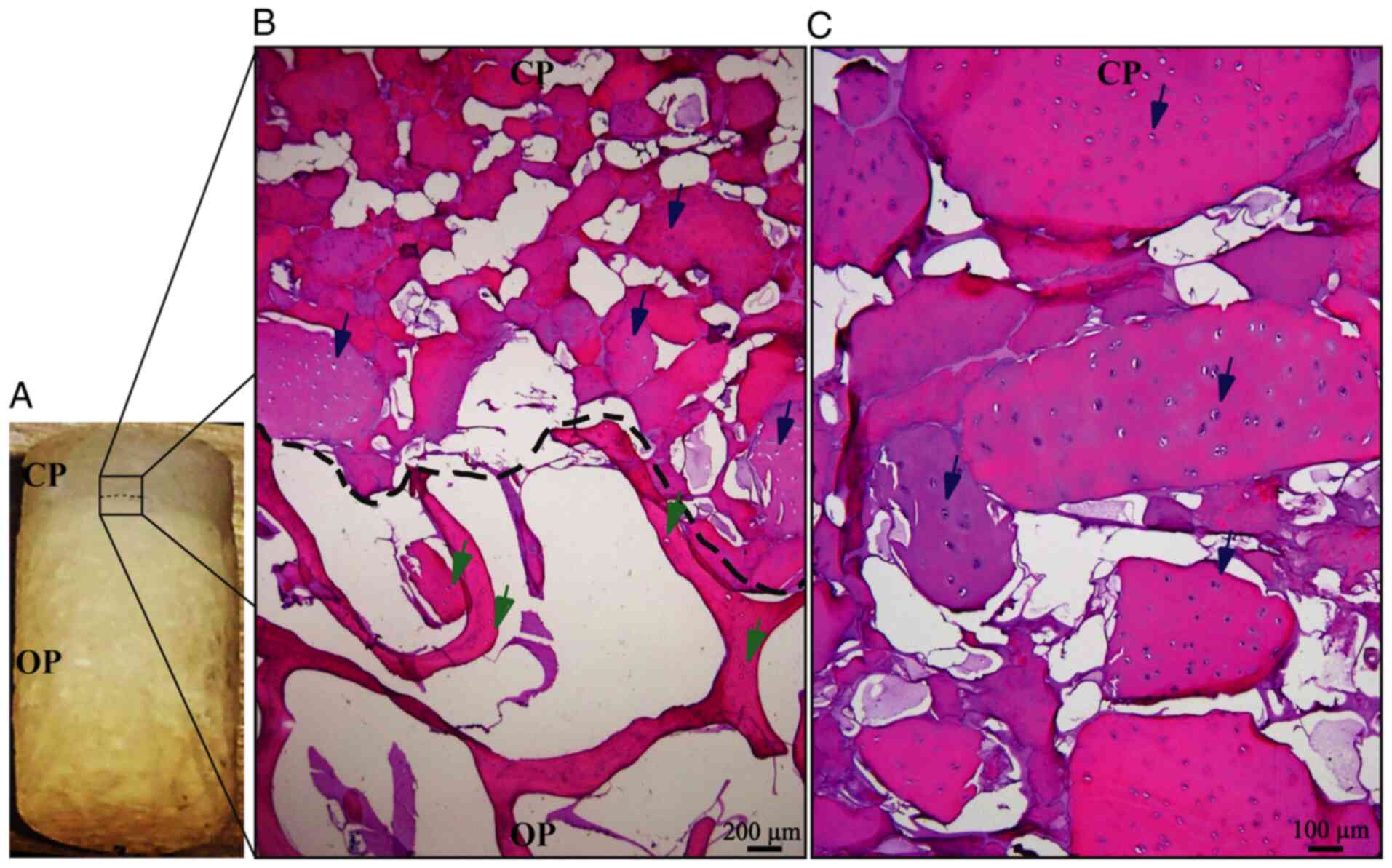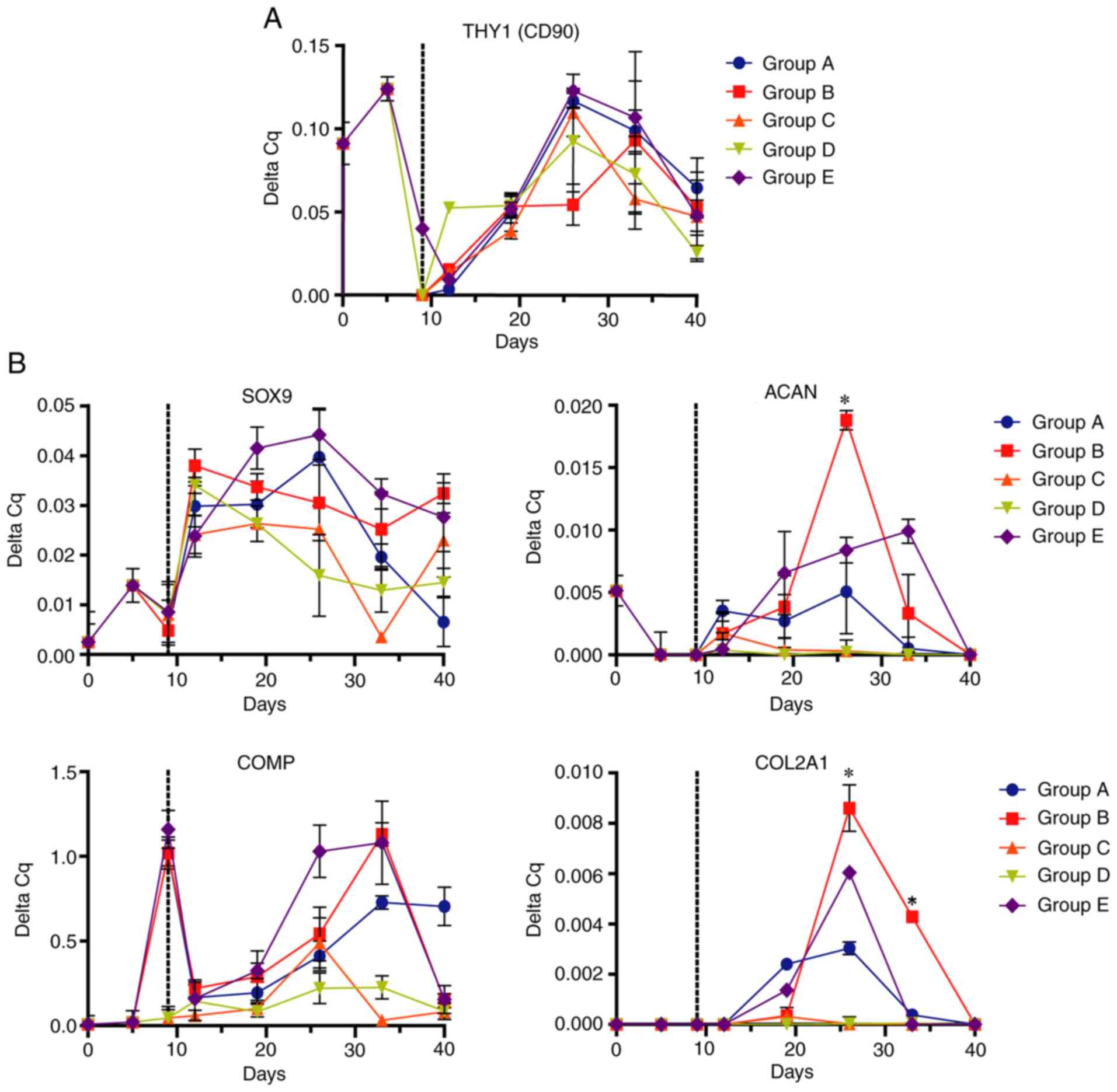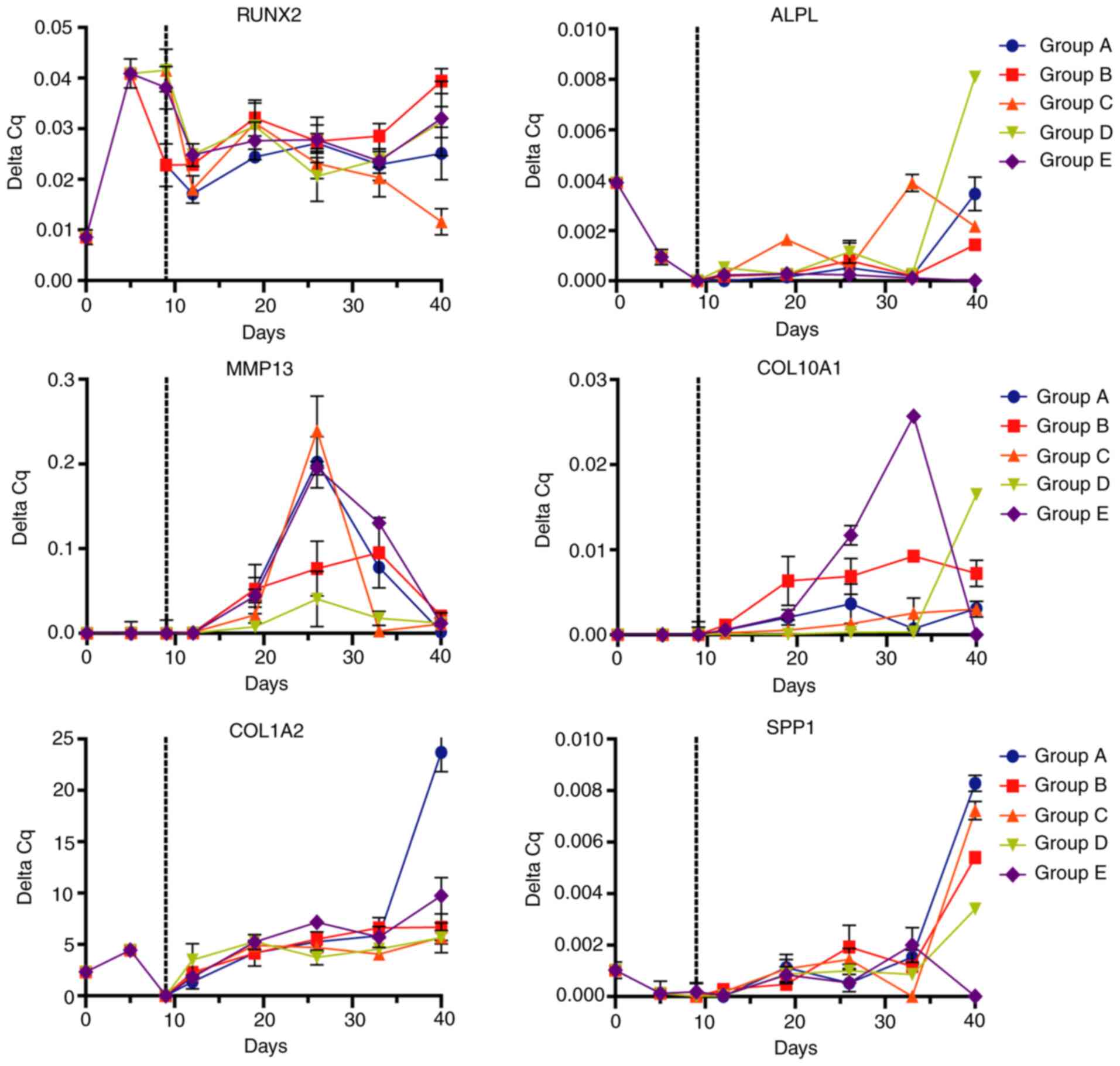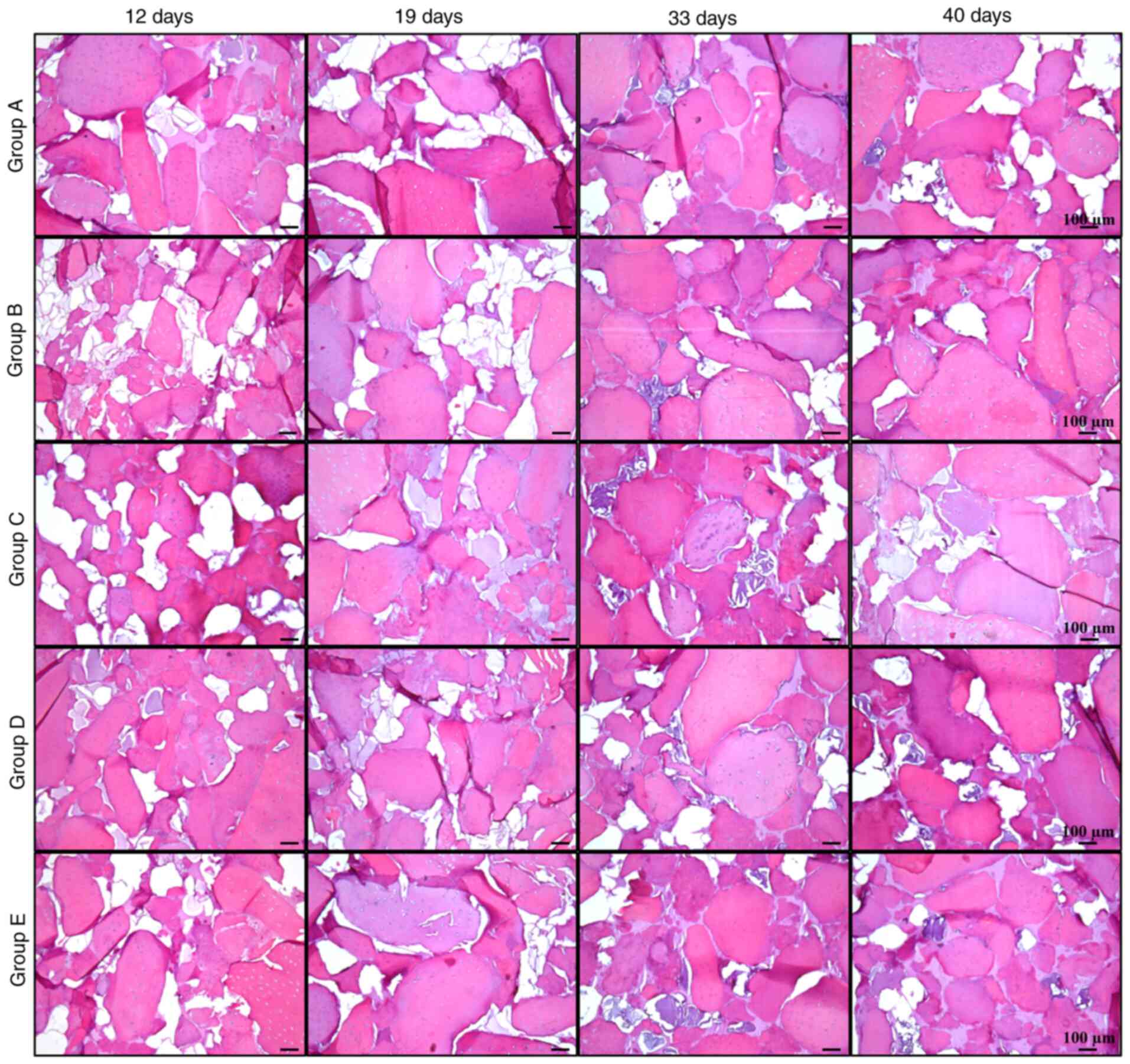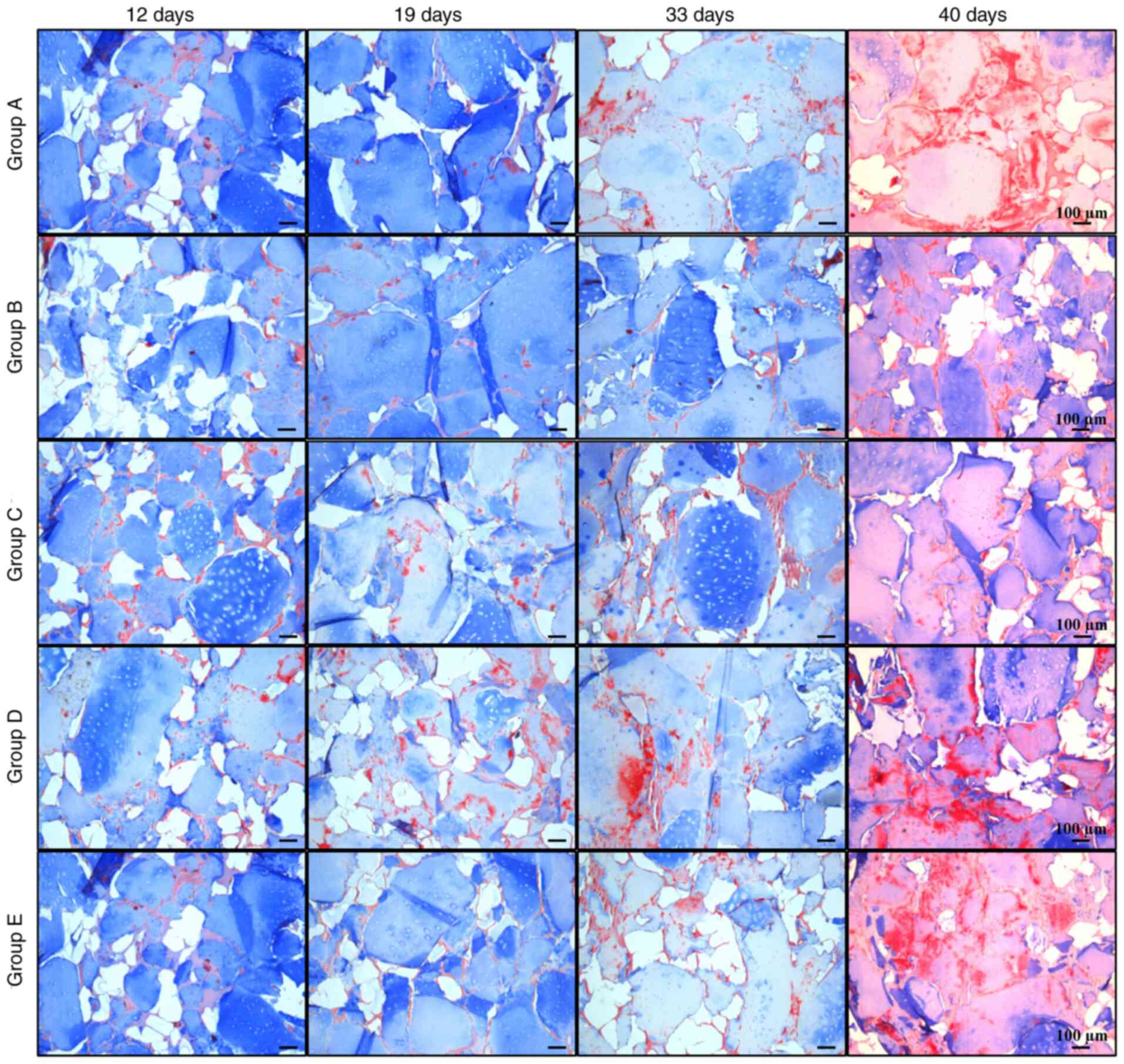|
1
|
Medvedeva EV, Grebenik EA, Gornostaeva SN,
Telpuhov VI, Lychagin AV, Timashev PS and Chagin AS: Repair of
damaged articular cartilage: Current approaches and future
directions. Int J Mol Sci. 19(2366)2018.PubMed/NCBI View Article : Google Scholar
|
|
2
|
Musumeci G, Mobasheri A, Trovato FM,
Szychlinska MA, Graziano AC, Lo Furno D, Avola R, Mangano S,
Giuffrida R and Cardile V: Biosynthesis of collagen I, II, RUNX2
and lubricin at different time points of chondrogenic
differentiation in a 3D in vitro model of human mesenchymal stem
cells derived from adipose tissue. Acta Histochem. 116:1407–1417.
2014.PubMed/NCBI View Article : Google Scholar
|
|
3
|
Sanchez Naranjo JC: Fisiología del
condrocito articular. Rev Colomb Reumatol. 15:21–33. 2008.
|
|
4
|
Devitt BM, Bell SW, Webster KE, Feller JA
and Whitehead TS: Surgical treatments of cartilage defects of the
knee: Systematic review of randomised controlled trials. Knee.
24:508–517. 2017.PubMed/NCBI View Article : Google Scholar
|
|
5
|
Li YY, Cheng HW, Cheung KM, Chan D and
Chan BP: Mesenchymal stem cell-collagen microspheres for articular
cartilage repair: Cell density and differentiation status. Acta
Biomater. 10:1919–1929. 2014.PubMed/NCBI View Article : Google Scholar
|
|
6
|
Delanois RE, Etcheson JI, Sodhi N, Henn RF
III, Gwam CU, George NE and Mont MA: Biologic therapies for the
treatment of knee osteoarthritis. J Arthroplasty. 34:801–813.
2019.PubMed/NCBI View Article : Google Scholar
|
|
7
|
Walker JM: Mesenchymal Stem Cells. 2nd
edition. Gnecchi M (ed). Springer, New York, NY, 2016.
|
|
8
|
Augustyniak E, Trzeciak T, Richter M,
Kaczmarczyk J and Suchorska W: The role of growth factors in stem
cell-directed chondrogenesis: A real hope for damaged cartilage
regeneration. Int Orthop. 39:995–1003. 2015.PubMed/NCBI View Article : Google Scholar
|
|
9
|
Cicione C, Muiños-López E, Hermida-Gómez
T, Fuentes-Boquete I, Díaz-Prado S and Blanco FJ: Alternative
protocols to induce chondrogenic differentiation: Transforming
growth factor-β superfamily. Cell Tissue Bank. 16:195–207.
2015.PubMed/NCBI View Article : Google Scholar
|
|
10
|
Zhou N, Li Q, Lin X, Hu N, Liao JY, Lin
LB, Zhao C, Hu ZM, Liang X, Xu W, et al: BMP2 induces chondrogenic
differentiation, osteogenic differentiation and endochondral
ossification in stem cells. Cell Tissue Res. 366:101–111.
2016.PubMed/NCBI View Article : Google Scholar
|
|
11
|
Sheykhhasan M, Qomi RT and Ghiasi M:
Fibrin scaffolds designing in order to human adipose-derived
mesenchymal stem cells differentiation to chondrocytes in the
presence of TGF-β3. Int J Stem Cells. 8:219–227. 2015.PubMed/NCBI View Article : Google Scholar
|
|
12
|
Zuo Q, Cui W, Liu F, Wang Q, Chen Z and
Fan W: Co-cultivated mesenchymal stem cells support chondrocytic
differentiation of articular chondrocytes. Int Orthop. 37:747–752.
2013.PubMed/NCBI View Article : Google Scholar
|
|
13
|
Zhong L, Huang X, Karperien M and Post J:
The regulatory role of signaling crosstalk in hypertrophy of MSCs
and human articular chondrocytes. Int J Mol Sci. 16:19225–19247.
2015.PubMed/NCBI View Article : Google Scholar
|
|
14
|
Hata K, Takahata Y, Murakami T and
Nishimura R: Transcriptional network controlling endochondral
ossification. J Bone Metab. 24:75–82. 2017.PubMed/NCBI View Article : Google Scholar
|
|
15
|
Mueller MB and Tuan RS: Functional
characterization of hypertrophy in chondrogenesis of human
mesenchymal stem cells. Arthritis Rheum. 58:1377–1388.
2008.PubMed/NCBI View Article : Google Scholar
|
|
16
|
Wang X, Li Y, Han R, He C, Wang G, Wang J,
Zheng J, Pei M and Wei L: Demineralized bone matrix combined bone
marrow mesenchymal stem cells, bone morphogenetic protein-2 and
transforming growth factor-β3 gene promoted pig cartilage defect
repair. PLoS One. 9(e116061)2014.PubMed/NCBI View Article : Google Scholar
|
|
17
|
Solorio LD, Dhami CD, Dang PN, Vieregge EL
and Alsberg E: Spatiotemporal regulation of chondrogenic
differentiation with controlled delivery of transforming growth
factor-β1 from gelatin microspheres in mesenchymal stem cell
aggregates. Stem Cells Transl Med. 1:632–639. 2012.PubMed/NCBI View Article : Google Scholar
|
|
18
|
Krinner A and Roeder I: Quantification and
modeling of stem cell-niche interaction. Adv Exp Med Biol.
844:11–36. 2014.PubMed/NCBI View Article : Google Scholar
|
|
19
|
Moncada-Saucedo NK, Marino-Martínez IA,
Lara-Arias J, Romero-Díaz VJ, Camacho A, Valdés-Franco JA,
Pérez-Silos V, García-Ruiz A, Lin H, Tuan RS, et al: A bioactive
cartilage graft of IGF1-transduced adipose mesenchymal stem cells
embedded in an alginate/bovine cartilage matrix tridimensional
scaffold. Stem Cells Int. 2019(9792369)2019.PubMed/NCBI View Article : Google Scholar
|
|
20
|
Saucedo M and Karina N: Diseño y
evaluación in vitro de un implante bifásico bioactivo para la
reparación de defectos osteocondrales. Universidad Autónoma de
Nuevo León, 2019.
|
|
21
|
Haghighi F, Dahlmann J, Nakhaei-Rad S,
Lang A, Kutschka I, Zenker M, Kensah G, Piekorz RP and Ahmadian MR:
bFGF-mediated pluripotency maintenance in human induced pluripotent
stem cells is associated with NRAS-MAPK signaling. Cell Commun
Signal. 16(96)2018.PubMed/NCBI View Article : Google Scholar
|
|
22
|
Zhang W, Sui Y, Ni J and Yang T: Insights
into the Nanog gene: A propeller for stemness in primitive stem
cells. Int J Biol Sci. 12:1372–1381. 2016.PubMed/NCBI View Article : Google Scholar
|
|
23
|
Damdimopoulou P, Rodin S, Stenfelt S,
Antonsson L, Tryggvason K and Hovatta O: Human embryonic stem
cells. Best Pract Res Clin Obstet Gynaecol. 31:2–12.
2016.PubMed/NCBI View Article : Google Scholar
|
|
24
|
Henderson JK, Draper JS, Baillie HS,
Fishel S, Thomson JA, Moore H and Andrews PW: Preimplantation human
embryos and embryonic stem cells show comparable expression of
stage-specific embryonic antigens. Stem Cells. 20:329–337.
2002.PubMed/NCBI View Article : Google Scholar
|
|
25
|
Pérez-Silos V, Moncada-Saucedo NK,
Peña-Martínez V, Lara-Arias J, Marino-Martínez IA, Camacho A,
Romero-Díaz VJ, Lara Banda M, García-Ruiz A, Soto-Dominguez A, et
al: A cellularized biphasic implant based on a bioactive silk
fibroin promotes integration and tissue organization during
osteochondral defect repair in a porcine model. Int J Mol Sci.
20(5145)2019.PubMed/NCBI View Article : Google Scholar
|
|
26
|
Blaudez F, Ivanovski S, Hamlet S and
Vaquette C: An overview of decellularisation techniques of native
tissues and tissue engineered products for bone, ligament and
tendon regeneration. Methods. 171:28–40. 2020.PubMed/NCBI View Article : Google Scholar
|
|
27
|
Livak KJ and Schmittgen TD: Analysis of
relative gene expression data using real-time quantitative PCR and
the 2(-Delta Delta C(T)) method. Methods. 25:402–408.
2001.PubMed/NCBI View Article : Google Scholar
|
|
28
|
Feldman AT and Wolfe D: Tissue processing
and hematoxylin and eosin staining. Methods Mol Biol. 1180:31–43.
2014.PubMed/NCBI View Article : Google Scholar
|
|
29
|
Rieppo L, Janssen L, Rahunen K, Lehenkari
P, Finnilä MAJ and Saarakkala S: Histochemical quantification of
collagen content in articular cartilage. PLoS One.
14(e0224839)2019.PubMed/NCBI View Article : Google Scholar
|
|
30
|
Carballo CB, Nakagawa Y, Sekiya I and
Rodeo SA: Basic science of articular cartilage. Clin Sports Med.
36:413–425. 2017.PubMed/NCBI View Article : Google Scholar
|
|
31
|
Zhang L, Hu J and Athanasiou KA: The role
of tissue engineering in articular cartilage repair and
regeneration. Crit Rev Biomed Eng. 37:1–57. 2009.PubMed/NCBI View Article : Google Scholar
|
|
32
|
Dulak J, Szade K, Szade A, Nowak W and
Józkowicz A: Adult stem cells: Hopes and hypes of regenerative
medicine. Acta Biochim Pol. 62:329–337. 2015.PubMed/NCBI View Article : Google Scholar
|
|
33
|
Xian CJ and Foster BK: Repair of injured
articular and growth plate cartilage using mesenchymal stem cells
and chondrogenic gene therapy. Curr Stem Cell Res Ther. 1:213–229.
2006.PubMed/NCBI View Article : Google Scholar
|
|
34
|
Somoza RA, Welter JF, Correa D and Caplan
AI: Chondrogenic differentiation of mesenchymal stem cells:
Challenges and unfulfilled expectations. Tissue Eng Part B Rev.
20:596–608. 2014.PubMed/NCBI View Article : Google Scholar
|
|
35
|
Danišovič Ľ, Varga I and Polák Š: Growth
factors and chondrogenic differentiation of mesenchymal stem cells.
Tissue Cell. 44:69–73. 2012.PubMed/NCBI View Article : Google Scholar
|
|
36
|
Almalki SG and Agrawal DK: Key
transcription factors in the differentiation of mesenchymal stem
cells. Differentiation. 92:41–51. 2016.PubMed/NCBI View Article : Google Scholar
|
|
37
|
Fujii S, Miura Y, Iwasa M, Yoshioka S,
Fujishiro A, Sugino N, Kaneko H, Nakagawa Y, Hirai H, Takaori-Kondo
A, et al: Isolation of mesenchymal stromal/stem cells from
cryopreserved umbilical cord blood cells. J Clin Exp Hematop.
57:1–8. 2017.PubMed/NCBI View Article : Google Scholar
|
|
38
|
Argentati C, Morena F, Bazzucchi M,
Armentano I, Emiliani C and Martino S: Adipose stem cell
translational applications: From bench-to-bedside. Int J Mol Sci.
19(3475)2018.PubMed/NCBI View Article : Google Scholar
|
|
39
|
Kwon H, Paschos NK, Hu JC and Athanasiou
K: Articular cartilage tissue engineering: The role of signaling
molecules. Cell Mol Life Sci. 73:1173–1194. 2016.PubMed/NCBI View Article : Google Scholar
|
|
40
|
Jiang X, Huang X, Jiang T, Zheng L, Zhao J
and Zhang X: The role of Sox9 in collagen hydrogel-mediated
chondrogenic differentiation of adult mesenchymal stem cells
(MSCs). Biomater Sci. 6:1556–1568. 2018.PubMed/NCBI View Article : Google Scholar
|
|
41
|
Demoor M, Ollitrault D, Gomez-Leduc T,
Bouyoucef M, Hervieu M, Fabre H, Lafont J, Denoix JM, Audigié F,
Mallein-Gerin F, et al: Cartilage tissue engineering: Molecular
control of chondrocyte differentiation for proper cartilage matrix
reconstruction. Biochim Biophys Acta. 1840:2414–2440.
2014.PubMed/NCBI View Article : Google Scholar
|
|
42
|
Xia C, Mei S, Gu C, Zheng L, Fang C, Shi
Y, Wu K, Lu T, Jin Y, Lin X and Chen P: Decellularized cartilage as
a prospective scaffold for cartilage repair. Mater Sci Eng C Mater
Biol Appl. 101:588–595. 2019.PubMed/NCBI View Article : Google Scholar
|
|
43
|
Kundu B, Rajkhowa R, Kundu SC and Wang X:
Silk fibroin biomaterials for tissue regenerations. Adv Drug Deliv
Rev. 65:457–470. 2013.PubMed/NCBI View Article : Google Scholar
|
|
44
|
Komori T: Runx2, an inducer of osteoblast
and chondrocyte differentiation. Histochem Cell Biol. 149:313–323.
2018.PubMed/NCBI View Article : Google Scholar
|
|
45
|
Mikasa M, Rokutanda S, Komori H, Ito K,
Tsang YS, Date Y, Yoshida CA and Komori T: Regulation of Tcf7 by
Runx2 in chondrocyte maturation and proliferation. J Bone Miner
Metab. 29:291–299. 2011.PubMed/NCBI View Article : Google Scholar
|
|
46
|
Hagmann S, Moradi B, Frank S, Dreher T,
Kämmerer PW, Richter W and Gotterbarm T: FGF-2 addition during
expansion of human bone marrow-derived stromal cells alters MSC
surface marker distribution and chondrogenic differentiation
potential. Cell Prolif. 46:396–407. 2013.PubMed/NCBI View Article : Google Scholar
|
|
47
|
Kabiri A, Esfandiari E, Hashemibeni B,
Kazemi M, Mardani M and Esmaeili A: Effects of FGF-2 on human
adipose tissue derived adult stem cells morphology and
chondrogenesis enhancement in transwell culture. Biochem Biophys
Res Commun. 424:234–238. 2012.PubMed/NCBI View Article : Google Scholar
|
|
48
|
Correa D, Somoza RA, Lin P, Greenberg S,
Rom E, Duesler L, Welter JF, Yayon A and Caplan AI: Sequential
exposure to fibroblast growth factors (FGF) 2, 9 and 18 enhances
hMSC chondrogenic differentiation. Osteoarthritis Cartilage.
23:443–453. 2015.PubMed/NCBI View Article : Google Scholar
|
|
49
|
Grafe I, Alexander S, Peterson JR, Snider
TN, Levi B, Lee B and Mishina Y: TGF-β family signaling in
mesenchymal differentiation. Cold Spring Harb Perspect Biol.
10(a022202)2018.PubMed/NCBI View Article : Google Scholar
|
|
50
|
Zhou Q, Li B, Zhao J, Pan W, Xu J and Chen
S: IGF-I induces adipose derived mesenchymal cell chondrogenic
differentiation in vitro and enhances chondrogenesis in vivo. In
Vitro Cell Dev Biol Anim. 52:356–364. 2016.PubMed/NCBI View Article : Google Scholar
|
|
51
|
Kim YI, Ryu JS, Yeo JE, Choi YJ, Kim YS,
Ko K and Koh YG: Overexpression of TGF-β1 enhances chondrogenic
differentiation and proliferation of human synovium-derived stem
cells. Biochem Biophys Res Commun. 450:1593–1599. 2014.PubMed/NCBI View Article : Google Scholar
|















